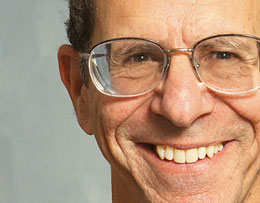Volume 26 · Number 3 · Spring 2009
Informed Dissent

Norm Matloff
(Page 5 of 5)
Norm Matloff: Speaking Up for America’s High-Tech Workers
Professor Norm Matloff’s research areas include parallel processing, computer communication networks and data security — traditional computer science fields not unlike those of his colleagues in the UC Davis Department of Computer Science. But it’s his active involvement in issues of immigration and employment, age discrimination and affirmative action that in 2002 earned him the Academic Senate’s Public Service Award. He is a critic of increasing the numbers of short-term visas, known as H1-Bs, issued to foreign, usually young, workers in the computer industry. Matloff maintains that such jobs ought to be filled by American programmers, many of whom are victims of age discrimination or are recent computer science graduates from U.S. universities. He believes that high-tech companies hire H1-B workers instead because they can pay them less. He maintains a Web site consisting of links to articles on various aspects of immigration written by specialists in the field. And he produces an electronic newsletter devoted to H1-B, offshoring and age discrimination issues (which he says are “all the same”) for subscribers who range from programmers and engineers to academics, researchers and policy analysts in Washington, D.C.
The e-mail messages Matloff receives from many of his subscribers make clear “they feel as long as they can explain to people in Congress what the situation really is with H1-B, then Congress will do the right thing,” he says. “And that’s not true.” Matloff says he was “a little naïve” when he first began talking with Washington policymakers about the issue. “I’d been keenly interested in politics since I was a kid, but I didn’t realize how the political world works” — how much power vested interests have on Capitol Hill. “And,” he says, “I didn’t expect it.”
Matloff says the original H1 visa program was specifically intended to enable “the best and the brightest” foreign nationals to be employed in the United States on a temporary basis while awaiting permanent residency (a “green card”). “And I highly support that,” he says. But vested interests — meaning, in this case, Matloff says, the tech industry, academia and immigration lawyers — have lobbied Congress to raise the numbers of H1-B visas issued because it’s to their economic benefit to build a workforce that’s willing to earn less.
“Academia has a huge vested interest in H1-B,” Matloff says. Universities hire many foreign nationals as postdoctoral researchers and then sponsor them for a green card, a process that can take several years. The H-1B visa allows them to work legally in the United States during that period. This can result in a graduate student pool that is willing to work for less money, thus keeping research assistant salaries low and driving away domestic students.
“Less obvious,” says Matloff, is that universities have a “huge incentive” to support the tech industry’s push for H1-Bs because it is to their mutual benefit — good relationships with industry can translate into donations of equipment and research funding, or even whole buildings. Matloff cites Stanford as an example, with its Bill Gates Hall, “a beautiful new computer science building” whose lobby features a donor list that’s “a who’s who,” Matloff says, of major high-tech companies. Across the street? “Hewlett Hall and Packard Hall.”
Matloff gives “high credit” to UC Davis and the College of Engineering for supporting his activities, citing the Academic Senate’s Public Service Award he received for his work.
“I’ve always had a social conscience,” Matloff says. And when an academic is involved in an issue, “I think it does make people pay more attention,” such as when representatives of an organization opposing H1-B talk to people on Capitol Hill,. Citing his work, Matloff says, gives the work “a little bit of legitimacy.”
Barbara Anderson is the former associate editor of UC Davis Magazine. She retired in March 2004.
